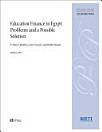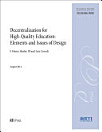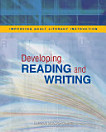Decentralization and decentralized education finance in Egypt (2007-2013)
F. Henry Healey · Rafik Hanna · Hany Attalla
Jan 2016 · RTI Press
E-Book
36
Seiten
family_home
Zulässig
info
reportBewertungen und Rezensionen werden nicht geprüft Weitere Informationen
Über dieses E-Book
Over the period 2007–2013, a series of undertakings were made to introduce fundamental elements of decentralized education finance to Egypt. In 2009, 8.4M Egyptian pounds (EGP) of the Government of Egypt’s (GOE) budget was decentralized to every primary school in three pilot governorates. By 2013, EGP 1.2B of the GOE’s money had been decentralized nationwide. This paper describes what these undertakings strived to achieve, what specifically was done to achieve these objectives, the degree to which these objectives were achieved, the reasons why they were achieved to the degree they were with particular attention paid to the institutional and political context within which these undertakings unfolded. The account of the technical work that was undertaken to decentralize these funds is important, but more important is the account of the interplay between the technical work, the fact that this work supported a GOE-led initiative, and the volatile political environment—pre-revolution, revolution, and post-revolution Egypt—in which the work was done for it is here where important lessons about reform emerge.
Autoren-Profil
PhD, is a Senior Education Scientist in the International Development Group at RTI International. He works with education systems around the world and across the United States to design and implement policy and reform strategies aimed at widespread and sustainable development.
BA, served as decentralization specialist for the United States Agency for International Development’s (USAID’s) Girls’ Improved Learning Outcomes Project in Cairo, Egypt (2008–2013).
BA, served as the Director of Decentralization and Deputy Chief of Party for USAID’s Girls’ Improved Learning Outcomes Project in Cairo, Egypt (2008–2013).
Dieses E-Book bewerten
Deine Meinung ist gefragt!
Informationen zum Lesen
Smartphones und Tablets
Nachdem du die Google Play Bücher App für Android und iPad/iPhone installiert hast, wird diese automatisch mit deinem Konto synchronisiert, sodass du auch unterwegs online und offline lesen kannst.
Laptops und Computer
Im Webbrowser auf deinem Computer kannst du dir Hörbucher anhören, die du bei Google Play gekauft hast.
E-Reader und andere Geräte
Wenn du Bücher auf E-Ink-Geräten lesen möchtest, beispielsweise auf einem Kobo eReader, lade eine Datei herunter und übertrage sie auf dein Gerät. Eine ausführliche Anleitung zum Übertragen der Dateien auf unterstützte E-Reader findest du in der Hilfe.




